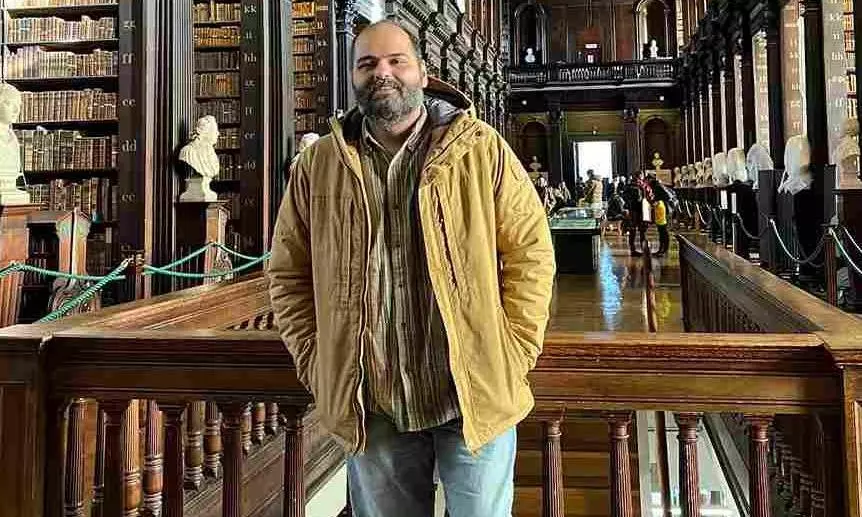
- Home
- India
- World
- Premium
- THE FEDERAL SPECIAL
- Analysis
- States
- Perspective
- Videos
- Sports
- Education
- Entertainment
- Elections
- Features
- Health
- Business
- Series
- In memoriam: Sheikh Mujibur Rahman
- Bishnoi's Men
- NEET TANGLE
- Economy Series
- Earth Day
- Kashmir’s Frozen Turbulence
- India@75
- The legend of Ramjanmabhoomi
- Liberalisation@30
- How to tame a dragon
- Celebrating biodiversity
- Farm Matters
- 50 days of solitude
- Bringing Migrants Home
- Budget 2020
- Jharkhand Votes
- The Federal Investigates
- The Federal Impact
- Vanishing Sand
- Gandhi @ 150
- Andhra Today
- Field report
- Operation Gulmarg
- Pandemic @1 Mn in India
- The Federal Year-End
- The Zero Year
- Science
- Brand studio
- Newsletter
- Elections 2024
- Events
- Home
- IndiaIndia
- World
- Analysis
- StatesStates
- PerspectivePerspective
- VideosVideos
- Sports
- Education
- Entertainment
- ElectionsElections
- Features
- Health
- BusinessBusiness
- Premium
- Loading...
Premium - Events

As the Kunal Kamra case shows, Indian political culture, steeped in hierarchy, views political humour as a danger, rather than as a healthy democratic exercise
In a democracy, ideal or otherwise, political satire is a crucial tool of accountability. Simply because it questions authority, critiques policy failures, and humanises politicians by revealing their sometimes-well-camouflag
However, in India, the space for political satire appears to be steadily shrinking, with comedians like Kunal Kamra frequently finding themselves at the receiving end of legal and political ire. (On Thursday (April 16), Kamra's arrest was stayed by the Bombay High Court till its verdict on his plea challenging an FIR over his gaddar jibe against Maharashtra Deputy CM Eknath Shinde.)
This begs a critical question: Why are Indian politicians so humourless? And aggressive? What prevents them from laughing at their own follies? Is it merely a psychological aversion to criticism, a cultural rigidity, or is there a deeper structural weakness?
I think the time is ripe to ask ourselves, claiming to live in the mother of democracies, as to what this intolerance means for the future of free speech in India. And we should have the courage to answer the question honestly, too.
Why can’t politicians take a joke?
One plausible explanation for the Indian political class’s aversion to satire lies in psychology. Political leaders, especially those in power, are often surrounded by sycophants who reinforce their authority and discourage self-doubt.
This phenomenon, known as the ‘narcissistic cocoon,’ creates an environment where any form of critique — even in jest — is perceived as an existential threat.
Also read: Kunal Kamra: The stand-up comedian, satirist, and the man who won’t shut up
Studies in political psychology suggest that authoritarian tendencies, even within democratic systems, often correlate with an inability to tolerate humour directed at oneself. Leaders who view themselves as the embodiment of the state — akin to monarchs of the past — tend to equate criticism of their governance with sedition.
Unfortunately, the Indian political culture, steeped in hierarchical traditions, further reinforces this insecurity, making political humour a dangerous exercise rather than a healthy democratic expression.
Cultural, structural barriers
Beyond psychology, India’s political culture itself discourages self-deprecating humour. Unlike in the West, where politicians often participate in comedy shows (think of Barack Obama at White House Correspondents’ Dinners, though sadly, Amber Ruffin’s performance was cancelled just a few days ago, or British Prime Ministers regularly being roasted in Parliament), Indian leaders project an image of solemnity and infallibility.
How could we not understand that democracies thrive on scrutiny, and the inability of politicians to handle humour only suggests an aversion to accountability?
This is partly a legacy of colonial rule, where authority was always imposed rather than negotiated, and partly due to the highly hierarchical nature of Indian society, where power is almost always revered rather than questioned.
Structurally, India’s legal and political institutions also contribute to this stifling of satire. Despite constitutional guarantees of free speech, specific laws related to sedition and hurting religious sentiments are frequently misused to silence critics.
Low level of press freedom
A study by the Free Speech Collective found that between 2014 and 2021, at least 800 people were charged with sedition in India, many of them for political dissent.
Meanwhile, India ranked 159 out of 180 countries in the 2024 World Press Freedom Index by Reporters Without Borders, indicating a significant decline in freedom of expression.
True, the Supreme Court has issued progressive judgments in favour of free speech, such as the landmark 2022 ruling that discouraged the indiscriminate use of sedition laws. As recently as last month, it pronounced that freedom of speech is integral to a healthy and civilised society.
However, these judgments often do not translate into tangible ground realities. The persistence of archaic defamation laws and the ease with which politicians can use state machinery to harass dissenters further contribute to the erosion of democratic discourse.
How others handle satire
A comparative perspective is necessary to gather insights into why some democracies are more tolerant of political satire.
In the United States, for example, satire is considered a fundamental aspect of democratic engagement. Shows like Saturday Night Live regularly lampoon sitting presidents and late-night hosts such as John Oliver and Stephen Colbert openly critique government policies without fear of legal repercussions.
In Germany, Chancellor Angela Merkel was once the subject of a satirical poem that caused diplomatic tensions. Yet, she refrained from pressing charges, recognising that satire is part of democratic life.
France, too, has a long tradition of political satire, with publications like Charlie Hebdo continuing to publish bold political caricatures despite controversy.
Necessary check
So why do politicians in these countries tolerate humour? One important reason is perhaps the maturity of their democratic institutions, where criticism is seen as a necessary check rather than an affront.
Additionally, cultural norms in these societies value individual expression and political engagement through humour, making satire a respected rather than feared tradition.
None can dispute that the suppression of political satire in India has far-reaching consequences. First, it creates a chilling effect, where comedians, journalists, and even ordinary citizens engage in self-censorship to avoid retribution. This undermines the very essence of democracy, where free expression should actually promote debate and dialogue rather than fear.
Second, the aggressive reaction to satire signals a deeper fragility in India’s political class. How could we not understand that democracies thrive on scrutiny, and the inability of politicians to handle humour only suggests an aversion to accountability?
Dangerous path
If humour is stifled, dissent quickly follows, and the broader space for free speech begins to shrink soon. Historically, the
From Nazi Germany’s crackdown on satirical art to the Soviet Union’s persecution of humorists, history is replete with examples of regimes that equated humour with dissent and responded with brute force.
Also read: How Vir Das punches in the face of power in Emmy Award-winning show, ‘Landing’
Should India walk this dangerous path is a critical question. Furthermore, let us not forget that an intolerance for satire builds a culture of fear, where even legitimate criticisms of government policies are avoided. This could lead to a breakdown of healthy political debate, making governance less transparent and more prone to inefficiency and corruption.
What could be done?
The first step towards reversing this trend is legal reform, which should be done as quickly as possible. Outdated laws that criminalise free speech under the garb of defamation or sedition need to be revisited. The Law Commission of India has, in the past, suggested reviewing these laws to align them with democratic principles, but sadly, little progress has been made in implementation.
Secondly, political culture must change. Perhaps it’s easier said than done. But Indian politicians must take cues from their Western counterparts and engage with humour rather than suppress it.
For all we know, one or two mandatory crash courses on humour may be beneficial, and participating in humorous debates, acknowledging public perception with good humour, and demonstrating a capacity for self-reflection would go a long way in easing public distrust.
Finally, and most importantly, civil society must continue to resist. The Indian public, media, and judiciary must collectively ensure that the right to satirise remains protected. The more political satire is challenged, the more it must be defended, lest India’s democracy be reduced to a humourless echo chamber of power.
Democratic ethos
India’s rich tradition of political humour has long reflected its robust democratic ethos. To lose this tradition to politicians’ thin-skinnedness is to lose a part of the nation’s democratic soul. A nation that cannot laugh at itself is a nation in decline.
As Kunal Kamra and many others face the wrath of the state, the real question is not whether satire can survive but whether India’s democracy can survive without satire.
The answer should concern every Indian who values free thought and expression.
(The Federal seeks to present views and opinions from all sides of the spectrum. The information, ideas or opinions in the article are of the author and do not necessarily reflect the views of The Federal.)


